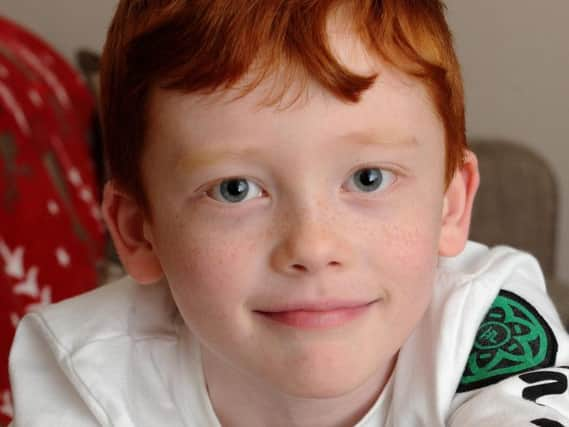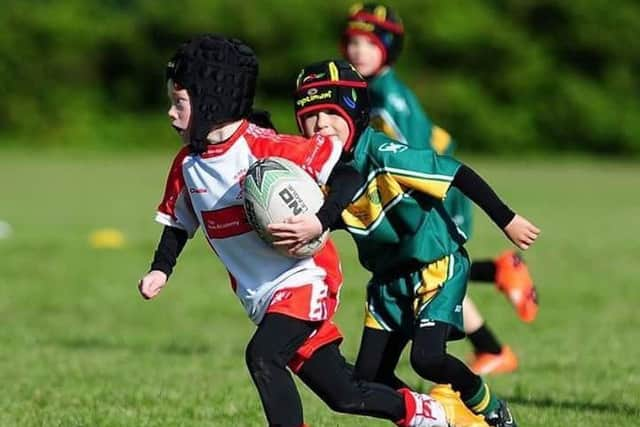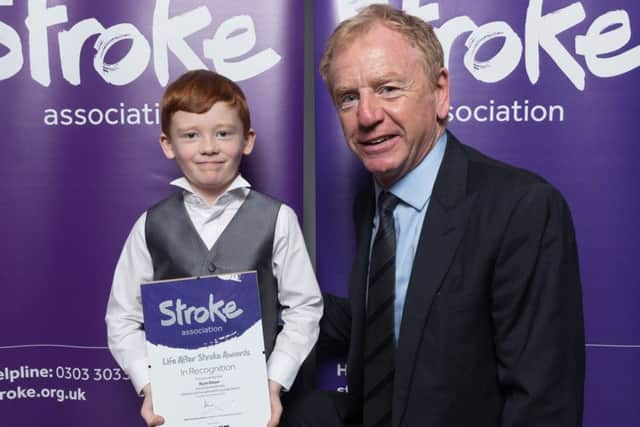"I had a stroke aged eight"


When he became unwell and sickly earlier this year, he thought he just had a bug which he would soon recover from.
But when Ryan, who lives in Lostock Hall, near Preston, literally fell out of bed one morning and revealed he could not use his leg, his mum Carolyne became alarmed and recognised the signs of a stroke as her own dad had suffered one years earlier.
Advertisement
Hide AdAdvertisement
Hide AdCarolyne, 45, who is married to Lee and also has a son Sam, 14, recalls: “Ryan became ill in the middle of January this year and he was constantly sick and we initially thought he had a bug but he did not have a temperature.


“It went on for a few days and Ryan would pick up a little and then go downhill again.
“Ryan then complained of tummy ache so I took him to the GP who examined him but could not find anything wrong and told us to come back if he didn’t improve.
“I don’t think anyone could have predicted what was going to happen.”
Advertisement
Hide AdAdvertisement
Hide AdA few days later, Carolyne heard a thud in Ryan’s bedroom at around 7:30am and went in to find him lying on the floor.


She remembers: “I asked Ryan what he was doing on the floor and told him to get ready for school.
“But Ryan told me he could not get up and the reason he had fallen out of bed was
because he could not stand on his left leg.
“I lifted Ryan up off the floor and his left leg was turned in and he collapsed back down again.


Advertisement
Hide AdAdvertisement
Hide Ad“I shouted for my husband and we carried Ryan downstairs. It was the way Ryan was holding his left leg and the way it was turned inwards that was worrying me.
“I said to my husband: ‘That’s how my dad held his leg when he had a stroke.”
The couple called 111 and they sent paramedics. Carolyne asked them if it was possible that Ryan had suffered a stroke or a mini stroke but they didn’t seem to think this was the case.
Carolyne says: “They said if it was a stroke, it would be the first in 20 years they had seen as it was very rare in children.


Advertisement
Hide AdAdvertisement
Hide Ad“I would never have thought of it myself if it wasn’t for the fact the way Ryan held his leg reminded me of my dad when he had a stroke.”
Ryan and his parents went to hospital and on the way there, the feeling started returning in Ryan’s leg.
While they were in A&E at Royal Preston Hospital, Ryan experienced a period of confusion as he had some Match Attax cards but he was unable to lay them out straight.
He was checked over at A&E but by this point he was walking on his leg again so doctors did not think it was anything serious and discharged him.
Advertisement
Hide AdAdvertisement
Hide AdHowever, on the way back to the car park, Ryan displayed some alarming symptoms. Carolyne explains: “On the way to the car park, Ryan began walking into the wall.
“He could not walk straight and was veering to the left.
“He looked spaced out and confused so I held out my fingers and asked him how many I was holding up but he could not tell me.
“We took him straight back to A&E and they transferred us to the children’s ward.”
An MRI scan confirmed Ryan had had an ischaemic stroke.
Carolyne says: “When they told us Ryan had suffered a stroke, it was a huge shock even though I’d started suspected a stroke.
Advertisement
Hide AdAdvertisement
Hide Ad“They carried out tests on him and discovered he had extremely high blood pressure. They put him on medication for it as it was so high.”
Ryan was put on aspirin to thin his blood and underwent lots of tests to see what caused the stroke but doctors couldn’t get to the bottom of it.
Ryan was discharged after six days and an outreach nurse came to the home to regularly check his blood pressure.
Ryan returned to Lever House Primary School in February but his parents weren’t prepared for the extreme tiredness that would hit Ryan.
Advertisement
Hide AdAdvertisement
Hide AdCarolyne explains: “We could not believe how tired Ryan was. He went to school and only lasted an hour at first as his teacher could see he was not going to be able to function more than that.
“Ryan had a phased return to school and gradually built it up over a period of weeks.
“His teacher is absolutely fantastic and came up with a timetable for Ryan including extra rest and snack breaks and this worked a treat.
“The whole school has been amazing and we could not have asked for better from them.
Advertisement
Hide AdAdvertisement
Hide Ad“A couple of Ryan’s friends visited him when he was in hospital and the whole school made get well cards for him.
“Ryan is now much better with fatigue than he was but he is still tired at the end of the week and at weekends.”
In March, Ryan had another MRI scan to look for a cause behind the stroke. His consultant at Preston sent the MRI scan to different consultants around the country to see if anyone could shed light on why the stroke had happened.
It was actually a consultant at Great Ormond Street Hospital who realised what it was.
Advertisement
Hide AdAdvertisement
Hide AdRyan has been diagnosed with a very rare condition called PRES (posterior reversible encephalopathy syndrome) which caused his stroke.
Carolyne says: “It is a very rare condition which caused Ryan’s blood pressure to go
really high and this caused the stroke.”
Ryan is now physically fine but is still on aspirin to thin his blood.
Ryan, who is a keen rugby player and plays for the
under-sevens at Leyland Warriors, was told by doctors he couldn’t play rugby for six months so he has missed this season.
Advertisement
Hide AdAdvertisement
Hide AdHowever, he is itching to get back to rugby and is hoping to return in the new season.
Ryan, who absolutely loves Lego, has become even more fascinated by it since his stroke as he became more intent on Lego when he was
unable to do anything else.
As a result of his stroke, Ryan is suffering from anxiety, which is understandable as he has been through a massive trauma.
Carolyne says: “Ryan is anxious about going to bed. We think this is because the stroke happened after he went to bed.
Advertisement
Hide AdAdvertisement
Hide Ad“It is almost like Ryan has reverted back to being a toddler as he has separation anxiety and won’t let me leave him in a room on his own. He likes to know we are in sight.
“I think he has a fear of something happening to him when we are not there.”
Ironically, Ryan raised money for the Stroke Association even before he had his stroke.
Carolyne says: “I have
followed the Stroke Association as a charity for a long time because of my dad having had a stroke.
Advertisement
Hide AdAdvertisement
Hide Ad“Ryan’s older brother chose to raise money for the Stroke Association and Ryan helped him – but this was before he had a stroke himself.
“Strokes can happen to anyone of any age for so many different reasons.
“I am now in touch with a few parents of children who have had strokes. Everyone has a different cause and different recovery.
“As a parent, your child having a stroke is something you never expect to go through.
Advertisement
Hide AdAdvertisement
Hide Ad“But having come through it, I do feel we are lucky and have come out of it lightly as other people who have strokes are left with disabilities.”
Ryan has received a Highly Commended Life
After Stroke Award from the Stroke Association in recognition of his courage after stroke.
Carolyne nominated Ryan for the Stroke Association’s Child Courage Award. He received his Highly Commended certificate at the Holiday Inn in Liverpool city centre. The event was supported by Randox Health.
His certificate was presented by former Liverpool FC footballer David Fairclough alongside Prof Tony Rudd, National Clinical director for stroke with NHS England and the charity’s chief executive officer Juliet Bouvarie.
Advertisement
Hide AdAdvertisement
Hide AdChris Larkin, director for the Stroke Association in the north says: “A stroke happens in an instant and often changes lives forever.
“We were thrilled that so many local people across the North West were nominated to receive a Life After Stroke Award.
“Our regional event highlights the tremendous courage people like little Ryan have shown in rebuilding their lives after a stroke or in helping others do the same.”
The Stroke Association’s Life After Stroke Awards recognise the courage shown by stroke survivors and carers as well as the great work and commitment shown by health professionals, groups and supporter organisations.
For more details, visit: www.stroke.org.uk/LASA